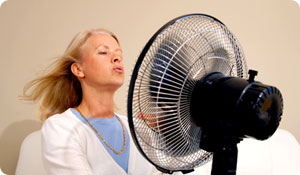
Are you always reaching for a sweater during the day, no matter what the weather, but find yourself uncomfortably warm at night? Or is it the opposite—you're one of those people who can't seem to cool off except while you're sleeping? And how come your body just can't seem to get in synch and keep you comfortable no matter what the time of day or night?
The underlying reason for these discrepancies is that our body temperatures fluctuate depending on the time of day. You have a built-in 24-hour clock called a circadian rhythm, which controls how awake or sleepy you are and how warm or cool your body is. Our lowest body temperature generally is achieved about two hours before you wake up in the morning. Your temperature rises slowly throughout the morning and afternoon, beginning to drop a bit around bedtime and continuing to lower until the early morning hours, at which point it rises slowly and the cycle repeats itself.
Although the changes in body temperature throughout the day and night are not vast, they can have a profound impact on how you feel. Sometimes this is due to age and stage of life. "People can vary in their abilities to tolerate certain temperatures," says Dr. Shelby Harris, director of the Behavioral Sleep Medicine Program at the Sleep-Wake Disorders Center at Montefiore Medical Center in New York and assistant professor of neurology and psychiatry at the Albert Einstein College of Medicine, also in New York. "The biggest factor I see in regulating temperature is—hormonal changes, especially menopause. Women have hot flashes, often at night, and can be very cold at other times." Dr. Harris also warns that health problems may be to blame. "There [are] other medical conditions as well that can lead to some people feeling very cold during the day (e.g. hypothyroidism). Thyroid issues in general can greatly affect the ways some people perceive temperature."
Finally, consider your sleeping environment. Sometimes the problem is as simple as a too-warm bedroom. "The ideal temps for sleeping are in the upper 50s and 60s," Dr. Harris says. If you routinely keep your thermostat at 70, and pile blankets on top of yourself, you may very well wake up in a puddle of sweat even if you're comfortable when you go to bed.
Source:
Interview with Dr. Shelby Harris, director of the Behavioral Sleep Medicine Program at the Sleep-Wake Disorders Center at Montefiore Medical Center and assistant professor of neurology and psychiatry at the Albert Einstein College of Medicine.





